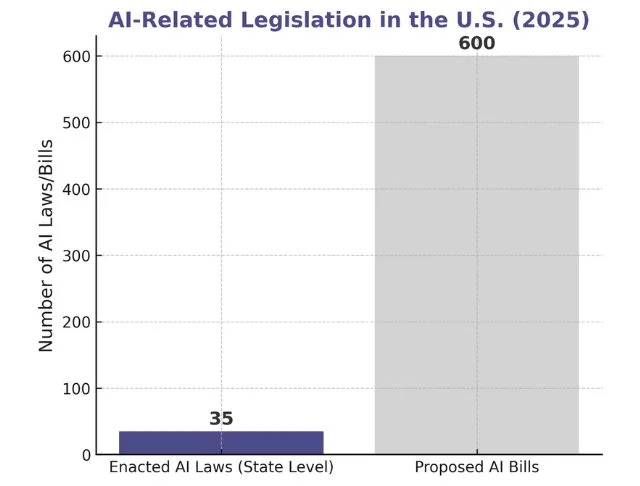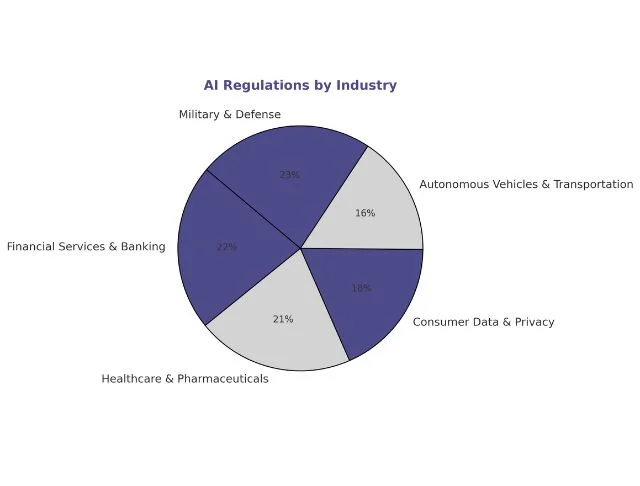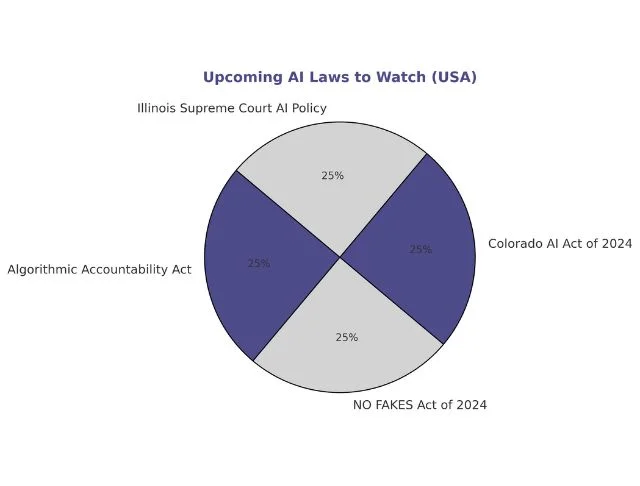by Abdullah Faraz
February 26, 2025
As of 2025, the U.S. has around 30-40 enacted AI-related laws at the state level and over 600 proposed bills across different states. However, there is no single federal law specifically regulating AI yet.1
These numbers are increasing rapidly as more states and countries introduce AI-specific regulations. These laws often govern areas like data privacy, deepfakes, and accountability.
So, tracking AI-related laws is as important as using AI. This ensures compliance, innovation, and ethical implementation.
To know more about laws against AI, keep reading:
AI Laws by Region

United States
As of 2025, the United States has 30-40 enacted AI-related laws, but these exist only at the state level. Meanwhile, over 600 bills have been proposed across different states.
However, there is no federal law enacted against AI in the U.S., though one might be introduced in the future. AI has drawbacks, but they are not considered as critical as those of social media. AI is highly beneficial, yet concerns such as website content scraping, future risks to humanity, human laziness, and misuse of AI may lead to further regulations.
States with Enacted AI Laws:
- California, Colorado, Connecticut, Delaware, Indiana, Montana, New Hampshire, New Jersey, Oregon, Tennessee, Texas, and Virginia have passed AI-related laws.
- More than half of U.S. states have some form of AI regulation in place.
European Union
As of February 2025, the European Union (EU) has implemented a comprehensive framework to regulate artificial intelligence. The European Parliament adopted the “EU AI Act” in May 2024, which serves as the primary legislation governing AI within the EU.
The EU first introduced guidelines on ethics in AI in 2019, providing non-binding recommendations for ethical AI deployment. Additionally, existing laws such as the General Data Protection Regulation (GDPR) and the General Product Safety Regulation impact AI applications.
Sources: Software improvement group, Whitecase
China
China has also implemented several AI regulations focusing on generative AI, deep synthesis technologies, and algorithmic recommendations. Although China does not have a law directly “against” AI, it has enacted several laws to govern its development and use, including:
- Interim Measures for the Management of Generative Artificial Intelligence Services (2023): Regulates generative AI services, emphasizing data privacy and content screening.
- Administrative Provisions on Deep Synthesis in Internet-based Information Services (2023): Requires labeling of AI-generated content.
- Administrative Provisions on Recommendation Algorithms in Internet-based Information Services (2021): Mandates algorithm filing for services influencing public opinion.
Source: Reedsmith
Other Countries
United Kingdom: The UK does not have any enacted or proposed AI laws. Instead, it follows a pro-innovation approach, emphasizing flexibility with five core principles: safety, security, transparency, fairness, accountability, and contestability. These principles were outlined in the AI Regulation White Paper (March 2023).
Canada: Canada does not have specific AI laws, but it is developing a regulatory framework. Existing regulations include:
- Artificial Intelligence and Data Act (AIDA)
- Risk-Based Approach (similar to the EU AI Act).
AI Regulations by Industry

Different industries have varying levels of strictness regarding AI. Where privacy concerns, safety, and fairness exist, rules tend to be stricter. The industries with the most AI regulations globally include:
Financial Services & Banking
- AI is used in fraud detection, credit scoring, and algorithmic trading, requiring strict regulations to prevent bias and financial misconduct.
- Key Laws: EU AI Act, U.S. Fair Lending Laws, Basel Committee Guidelines.
Healthcare & Pharmaceuticals
- AI is used in medical diagnostics, robotic surgeries, and drug development, impacting patient safety and privacy.
- Key Laws: HIPAA (U.S.), EU AI Act, China’s Medical AI Regulations.
Consumer Data & Privacy
- AI-driven personalization and targeted ads rely on large amounts of user data, raising privacy and misinformation concerns.
- Key Laws: GDPR (EU), CCPA (California), China’s Algorithm Regulation Laws.
Autonomous Vehicles & Transportation
- AI-driven self-driving cars and drones pose safety and liability risks.
- Key Laws: EU AI Act, U.S. NHTSA Regulations.
Military & Defense
- AI is used in autonomous weapons, surveillance, and cybersecurity, requiring ethical safeguards.
- Key Laws: UN AI Weapons Proposals, U.S. Defense AI Strategy, China’s Military AI Governance Rules.
Upcoming AI Laws to Watch

Here are some upcoming AI laws and regulatory developments to watch globally:
Global Developments
EU AI Act: The EU’s comprehensive AI Act is expected to influence global AI governance through a risk-based approach.
Brazil’s AI Regulation Bill: Bill 2338/23 aims to establish a national AI regulatory system in Brazil. Currently under review.
China’s Draft AI Law: China is developing a comprehensive AI law to regulate AI development and deployment.
U.S. Developments
Algorithmic Accountability Act: Proposed legislation to regulate AI systems in critical decision-making areas (e.g., housing, healthcare, employment).
NO FAKES Act of 2024: Protects intellectual property rights in AI-generated content, particularly voice and likeness infringement.
Colorado AI Act of 2024: Uses a risk-based approach to regulate high-risk AI systems, focusing on transparency and risk mitigation.
Illinois Supreme Court AI Policy: Effective January 1, 2025, this policy guides ethical AI use in judicial systems.
Canada
Artificial Intelligence and Data Act (AIDA): Part of Bill C-27, AIDA aims to establish a risk-based framework for AI system regulation.
Sources: Techtarget, Software improvement group, Iapp
Conclusion
With the rise of AI across industries, more laws are being enacted to regulate and govern AI usage. Although there is no federal AI law in the U.S., 30-40 AI-related laws exist at the state level, with over 600 proposed bills.
- California, Colorado, Connecticut, Delaware, Indiana, Montana, New Hampshire, New Jersey, Oregon, Tennessee, Texas, and Virginia are leading in AI regulations.
- Some industries have stricter AI laws, including Financial Services, Healthcare, Consumer Data, and Autonomous Vehicles.
- Notable AI regulations include the EU AI Act, AIDA, and various state-level laws in the U.S..
Here are some AI law statistics to help understand global AI legislation trends.